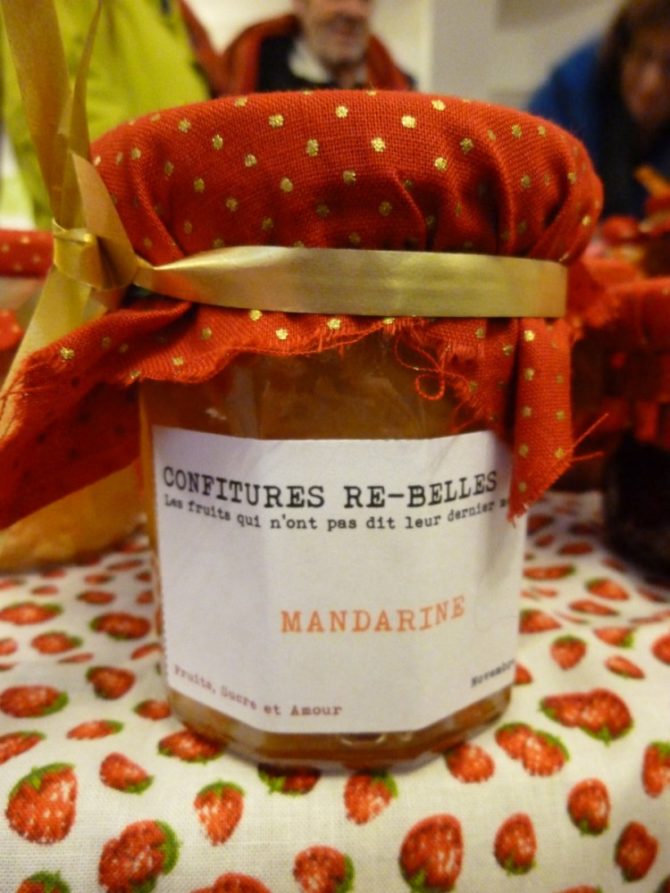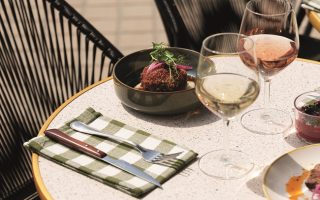Re’Belles: Fighting Food Waste One Jam Jar at a Time

What happens to all the produce that goes unsold at the grocery store or the market? Unfortunately, most of it simply gets thrown away. It’s a reality of our food system that has always nettled Alice Blaise, a 28-year-old Marseille native.
“There are so many people who go hungry and yet, here we are throwing away massive quantities of food,” she told me one Saturday afternoon as we discussed Re’Belles, the canning project she’s currently developing.
Inspired by the success of Rubies in the Rubble, a venture in London making chutney with surplus fruits and vegetables, Alice and her roommate and business partner, Colette, decided to launch a similar initiative in Paris earlier this year. With a three-fold goal of environmental, social and economic responsibility, Re’Belles gives produce that would otherwise end up in the trash a second life as jams and jellies.
A Labor of Love
On the sixth floor of a walkup in the 18th, where crates of fruit vie for space with carefully stacked glass jars and at least one bedroom resembles a pioneer’s pantry, the women roll up their sleeves and get out their ladles. “It’s hard work. There are a lot of things you don’t think about,” Alice explained. “We have to get up early to be at the market to collect fruit—and we’re talking kilos of fruit.” Transportation is a real challenge; Paris’ new AutoLib’ service is too pricey for extended fruit-collecting and the metro would be a nightmare–just try to imagine squeezing crates of plums into a rush-hour crowd.
Back at the apartment, Alice and Colette get to work. “Before we can cook, we have to peel and chop everything.” For a mandarin jam, that means removing not only the rind, but also the stringy, tenacious white membrane holding the pulpy slices together. “By the time all that’s finished, we’re hungry and have to stop to eat. After that, we question whether we shouldn’t finish the next day…”
And of course jam wouldn’t be jam without jars. The prepping process includes cleaning and removing labels from glass jars, often donated by friends and neighbors. “Our entire building knows when we’re making jam–you can smell it!” says Alice.
A Recipe for Rescuing Fruit
Over the last year, the pair has produced three batches of preserves, each one a little better than the last. In addition to using rescued produce, Alice and Colette put their signature on Re’Belles preserves by using interesting fruit and spices, as in a recent jelly that married grapes and star anise. And while similar initiatives try to downplay the fact that their products are made with rescued produce, Re’Belles has decided to put it front and center. “We want to show people that it’s possible to make a high quality, attractive product using surplus fruits,” said Alice.
At the moment, the biggest challenge for Re’Belles is finding a continuous supply of reliable fruit. That means making friends with market farmers and getting to know the right people at supermarkets in the city. “We’re never really sure which fruit we’ll get, so we have to adapt our production to the supply,” explains Alice. Tomatoes, strawberries, peaches and red peppers are some of what has shown up in the last 10 months. “We’ve still got to get through an entire year to refine recipes for each season,” she explains.
While most of the fruit they collect is in perfect shape, rejected simply because a new shipment arrived before the last could be sold, there are still disappointments; some fruit is clearly too far past its prime to make it in to a Re’Belles jam.
Re’Belles would like to source fruit that is as local as possible, but Alice points out that in the context of food waste, it’s not necessarily the most important criterion. “The challenge in Paris is finding fruit grown in the region. Most of the local farmers grow vegetables,” explains Alice. “Though I’d love to use local fruit, I’d rather see fruit from elsewhere in France or the world end up in our jams than in the trash.”
Successful, Sustainable, Responsible
Alice and Colette are currently undertaking a feasibility study to determine if their idea can stay the course. Part of that includes finding willing restaurants or organizations with kitchen facilities where they can cook in large batches. “At the moment we’re doing everything at home, kilo by kilo. If we want to grow, we need to find a better system,” says Alice.
Alice and Colette’s long-term goal for Re’Belles is to create employment for people in difficulty, known as réinsertion in French. Once they’ve found a steady stream of fruit, they’ll start thinking about an economic model that allows them to be sustainable. While they’ll likely start out in health-food stores and other eco-friendly outlets, the goal isn’t to limit sales to a niche market. “We want to reach a population that isn’t necessarily familiar with the questions of food waste. Ideally, we’d like to partner with a supermarket, which would provide us with a steady supply of fruit and a place to sell our product.”
Although the project is still in the early phases of development, it’s already getting positive reactions. Re’Belles was recently pre-selected by the social business incubator at ESSEC, the European business school, for their mentorship program. If selected for next year’s session, Alice and Colette will get help building a solid business plan and finding the all-important funding that will help them grow into the successful, sustainable and responsible business they envision.
As we finish up our chat, Alice takes a jar out of her bag. I recognize the brand etched in the glass just visible under a colorful fabric topper held in place by a rubber band. The jar, like the peaches inside, is getting a second chance as a Re’Belle. “I like good things, but I like good things that make sense.”
Re’Belles is often present at the Comptoir Urbain in the 20th arrondissement.
Unabashedly gourmande, Kate Robinson can regularly be found sleuthing out the best watering holes, secret gardens and food joints in Paris.
Share to: Facebook Twitter LinkedIn Email
Leave a reply
Your email address will not be published. Required fields are marked *



